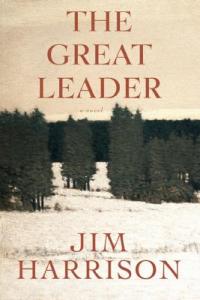The Great Leader by Jim Harrison
 Friday, September 30, 2011 at 5:44PM
Friday, September 30, 2011 at 5:44PM 
Published by Grove Press on October 4, 2011
As a divorced police detective in Marquette, Michigan, Sunderson's life is generally sedate. The kind of crime that requires detective work is far from rampant in the Upper Peninsula. His hobbies include trout fishing and surreptitiously watching a teen neighbor arise naked from her bed each morning. Sunderson is sure he would cut off his own hands before touching the girl "but then he wondered how one would go about cutting off his own hands." Every ten days a married woman visits Sunderson for sex. Sunderson considers "what it would be like to be full of firm moral resolve" but clearly that's an experience he will never have.
Sunderson's final investigation before retirement involves a cult leader (known to the cult's members as the Great Leader but adopting the name Dwight as his most recent alias) who was rumored to have been sexually involved with minors before apparently faking his death. Unsuccessful in his attempt to locate the culprit, Sunderson decides to flee from his home after his retirement party (where he is chagrined to learn that his inappropriate behavior with a dancing girl -- who happens to be a potential witness against Dwight -- was seen by the other attendees). Sunderson travels to Arizona where he takes up a new hobby: investigating "the crime of religion," which amounts to searching for Dwight. There he meets more women: Lucy, who reminds him a bit too much of Diane, his ex-wife; and Melissa, a nurse whose protective brother is a drug lord. His time in the Southwest gives Sunderson ample opportunity to ruminate about his failures and obsessions, an occupation he continues after his return to the U.P.
Jim Harrison writes lovingly of land and nature; the reliability of its "indefatigable creature life" contrasts with the unreliability of human nature. Although Sunderson keeps track of Dwight's activities, what passes for a plot in The Great Leader is just an excuse for Harrison to exercise his wit and make pithy observations about American life. Harrison focuses his dry and occasionally outrageous humor on a variety of human behavior (and misbehavior). His most prominent targets are sex, religion, money, divorce, and retirement (the last of which makes Sunderson feel "not quite like a roadkill but like a man whose peripheries have been squashed, blurred, by the loss of his defining profession.") Harrison skewers the notion that men can reinvent themselves after retirement; Sunderson's efforts leave him feeling like "a dog who, hit by a car, drags himself into a ditch trying to be more out of harm's way." As he did in The English Major, Harrison has fun exploring the sexual interests of a man who, having physically passed beyond middle age, demonstrates the emotional maturity of a rutting teenager.
Warnings: In his descriptions of Sunderson's intimate life and fantasies, Harrison is explicit -- no more so than many modern humorists, but enough to put off readers who disapprove of erotic content, even when it's funny. Sunderson's thoughts provide a running commentary on history, politics, and sex after sixty -- topics that might offend readers who disagree with his pointed opinions. Others might be upset that Sunderson doesn't vigorously condemn every adult who has sex with a teenager (a frequent subject of his wandering thoughts). Whether I agreed with Sunderson's opinions or not -- sometimes I did, sometimes I didn't -- they frequently made me laugh, and I found many of his notions about society's failings to be on target.
When I read a Harrison novel, it takes me awhile to adjust to his unique style. I wouldn't describe his sentences as run-on, but the man is no fan of the comma. The style isn't necessarily bad, just different -- although I'm not sure I ever completed the adjustment. I don't read Harrison novels for stylistic brilliance, and I wouldn't recommend this one for its plot, which doesn't amount to much. I nonetheless enjoyed this book (and recommend it) for its humor and for its perceptive takes on life as seen through the eyes of a Midwestern senior citizen. Harrison provokes serious thought nearly as often as snickers and chuckles. He is the best chronicler of the "aging man blues" I've come across. When I laugh at the foibles displayed by his characters, I'm often laughing at myself. That, for me, made the reading experience worthwhile.
RECOMMENDED
Reader Comments